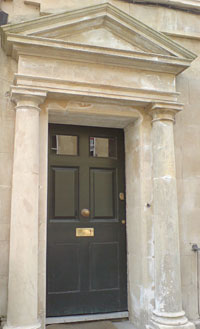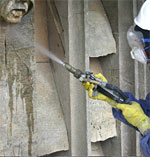Stone cleaning
 Minerva
has developed many different techniques for the sensitive removal of
surface pollutants. All projects are different and no dogmatic rules
apply, but we prefer to use of a range of techniques including
poulticing and timed intermittent mist sprays. For larger jobs we find
the best way to clean materials such as terracotta, Bath stone, brick
and even wood conservatively is with the Jos/Torc system.
Minerva
has developed many different techniques for the sensitive removal of
surface pollutants. All projects are different and no dogmatic rules
apply, but we prefer to use of a range of techniques including
poulticing and timed intermittent mist sprays. For larger jobs we find
the best way to clean materials such as terracotta, Bath stone, brick
and even wood conservatively is with the Jos/Torc system.
Buildings that are cleaned without proper care can store up
problems for the future. An example of poor practice (right) is this
entrance porch that was saturation-cleaned by water booms that were left
on for long periods. This method, commonly used in Bath and Bristol,
leaves the structure too clean, removes the patina of age and, more
worryingly, causes ‘blooming’ by the mobilization of soluble salts,
especially around the stone joints, which will lead to rapid decay of
the stonework. When cleaning brick, for example, the fireskin is easily
damaged and once damaged the decay of brickwork can be rapid.
The JOS technique works with a mixture of water (up to 10 gallons
per hour), low air pressure and fine, inert abrasive powder. Together
these form a swirling vortex, which when fired onto the contaminated
surface, removes unwanted elements such as grafitti, certain types of
paints, carbon deposits, dirt and scale from a wide variety of
materials. A range of JOS nozzles are available for most tasks. The
standard nozzle will quickly and efficiently clean most surfaces. A
micro nozzle can be used for more detailed work and when matched with a
soft abrasive powder such as talc will not harm the surface. The JOS
system is chemical free and environmentally friendly, which makes it
safe and ideal for city centre use.

Another method of cleaning that we employ is the DOFF System of 'SuperHeated Water' The DOFF system is different from other 'steam' or 'hot water' systems currently available and should not be confused with them, as it is actually 'superheated' water that exits the heat-resistant nozzle, not just hot (70-90), or steam. The desired pressure can be adjusted by the operator and is independent of temperature settings. Temperature can be increased at anything up to 150c if necessary. The Doff is not suitable for old limewashes, delicate or decaying stonework but can be particularly useful for the removal of oil-based paints and emulsions.